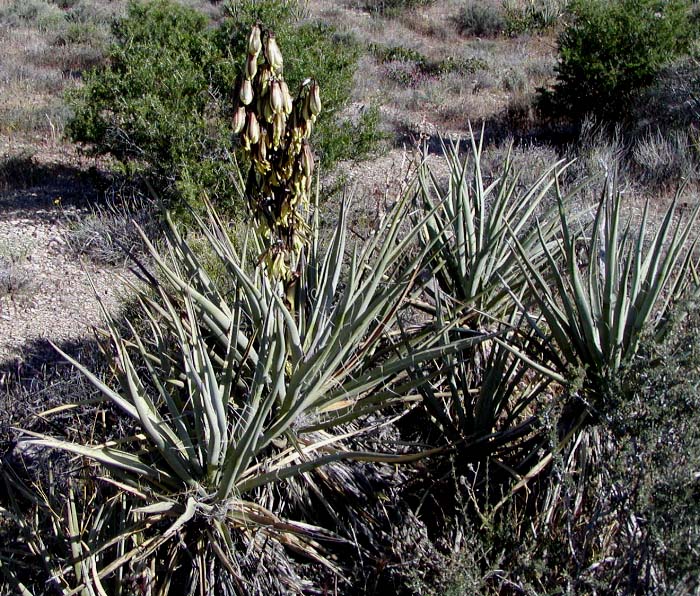New Account | Seed Mix |
Gift Certificates |AAS Winners |
Gardening Products
SEEDS: Unusual | Annuals | Perennials | Vegetables | Herbs | Trees
Our favorite list of Yucca Plant seeds from around the world.
JB101 Banana Yucca (Yucca baccata)
A small, short trunked or often trunkless Yucca with very hard, thick, bluish, deeply concave leaves. It is widely distributed over northern Mexico and the southwestern United States and is found in mountain areas up to 7900 ft. It is extremely hardy to frost and considered to possibly being the hardiest of all trunked Yucca. Slow but easy to grow and very ornamental.
Most yuccas have dry hard fruits, but the fruits of banana yucca are fleshy and succulent. They look roughly like short fat green bananas, thus the name. These fruits were a traditional food of the Apache and Navajo. They were prepared by roasting or baking, stripping out the seeds, pounding the remaining flesh into a pulp, forming the pulp into flat cakes, and sun-drying them for later use.
The resulting product is said to be nutritious, sweet, and delicious. The fruits were often picked before maturity and ripened off the plant to keep wildlife from eating them before they could be harvested Hardy for zones 6-11.
Most yuccas have dry hard fruits, but the fruits of banana yucca are fleshy and succulent. They look roughly like short fat green bananas, thus the name. These fruits were a traditional food of the Apache and Navajo. They were prepared by roasting or baking, stripping out the seeds, pounding the remaining flesh into a pulp, forming the pulp into flat cakes, and sun-drying them for later use.
The resulting product is said to be nutritious, sweet, and delicious. The fruits were often picked before maturity and ripened off the plant to keep wildlife from eating them before they could be harvested Hardy for zones 6-11.
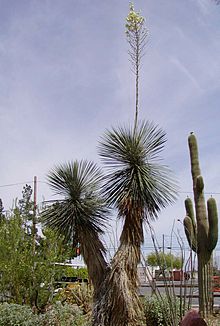
JB166 Soaptree ( Yucca elata )
This ornamental Yucca gets it's name from the soapy material in the roots and trunks of this species that has been used as a soap substitute. It has great ornamental appeal, is deer resistant, and attracts hummingbirds, butterflies and bees.
Cattle relish the young flower stalks, and chopped trunks and leaves serve as emergency food during droughts. Indians ate the flower buds, flowers, and young flower stalks of this and other yuccas, either raw or boiled.
Yucca elata is a common, widespread and quite distinctive species, growing tall and eventually branching, forming tree-like plants up to 15 feet high, resembling the Joshua tree through generally smaller, with longer leaves and fewer branches. Ranges of the two overlap in southwest Utah and northwest Arizona, but the soaptree yucca is more common further east, in the grasslands and foothills of central and southeast Arizona, and the flat plains of New Mexico.
Leaves are pale or bright green in color, thin and flexible, up to half an inch across (slightly wider in the middle) and between 10 and 35 inches long. The edges are white, as are the short terminal spines and the long, curly filaments that grow most densely towards the center. Plants are old before they branch, hence most specimens have only one stem; the (usual) maximum number observed is seven. Dead leaves hang back against the stem and remain there for many years. Flower clusters are borne on stems rising 2 or 3 feet above the leaves. Flowers are pendant, globular or bell-shaped.
Hardy to zero degrees, also makes a great container plant when young.
Zones 6-10.
Cattle relish the young flower stalks, and chopped trunks and leaves serve as emergency food during droughts. Indians ate the flower buds, flowers, and young flower stalks of this and other yuccas, either raw or boiled.
Yucca elata is a common, widespread and quite distinctive species, growing tall and eventually branching, forming tree-like plants up to 15 feet high, resembling the Joshua tree through generally smaller, with longer leaves and fewer branches. Ranges of the two overlap in southwest Utah and northwest Arizona, but the soaptree yucca is more common further east, in the grasslands and foothills of central and southeast Arizona, and the flat plains of New Mexico.
Leaves are pale or bright green in color, thin and flexible, up to half an inch across (slightly wider in the middle) and between 10 and 35 inches long. The edges are white, as are the short terminal spines and the long, curly filaments that grow most densely towards the center. Plants are old before they branch, hence most specimens have only one stem; the (usual) maximum number observed is seven. Dead leaves hang back against the stem and remain there for many years. Flower clusters are borne on stems rising 2 or 3 feet above the leaves. Flowers are pendant, globular or bell-shaped.
Hardy to zero degrees, also makes a great container plant when young.
Zones 6-10.

3427 Beaked Yucca ( Yucca rostrata )
A remarkably beautiful Yucca that forms a large, spherical crown of blue-grayish green, narrow leaves, supported by a moderately tall, solitary trunk, clothed at least in its upper part in a dense skirt of dead leaves. Native to northern Mexico and western Texas, it is slow growing but very hardy to drought as well as severe cold.
Zone 5-11.
Zone 5-11.

JB224 Adam's needle ( Yucca filamentosa )
Also known as bear grass, weak-leaf yucca, Adam's needle looks a little like a small palm, but is actually more closely related to the lilies. The leaves of Adam's needle are strap-like, about an inch wide and up to 2 or 3' long. The leaves are basal; that is, they all originate from one point, taking the form of a rosette. The margins of the leaves are decorated with long curly threads or "filaments" that peel back as the leaf grows, eventually dropping off on older leaves. The inflorescence is very showy and borne on an erect spike up to 12' high. The individual flowers (up to several dozen) are white and about 2" long. The plant dies after flowering and fruiting, but produces lateral buds that start new plants around the edges of the original.
Light: prefers full sun, but will tolerate some light shade.
Moisture: average to dry soild - drought tolerant.
Hardiness: USDA Zones 6-10.
Use in mixed borders and natural areas. Excellent in rock gardens and as an accent among other perennials. Can be grown in outdoor container.
Light: prefers full sun, but will tolerate some light shade.
Moisture: average to dry soild - drought tolerant.
Hardiness: USDA Zones 6-10.
Use in mixed borders and natural areas. Excellent in rock gardens and as an accent among other perennials. Can be grown in outdoor container.
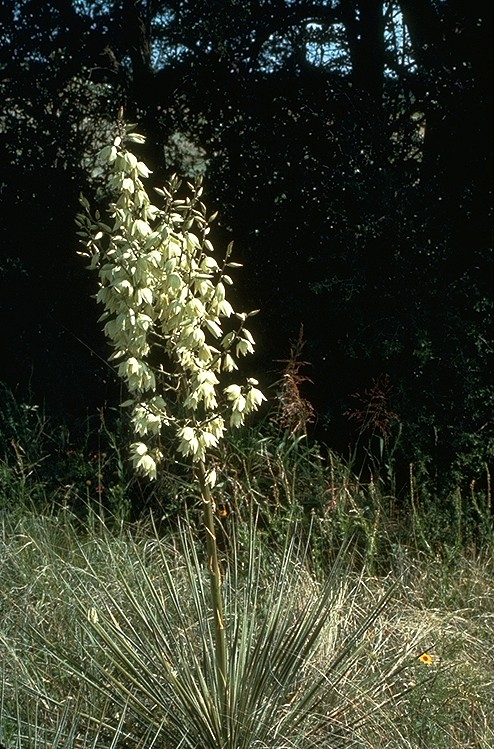
3383 Soapweed Yucca ( Yucca glauca )
This clumping evergreen shrub with narrow leaves produces a startling, 3- to 4-foot-tall flower stalk. The fragrant flowers are pale green or greenish white. It is a tenacious plant in areas of the American West, but adds a touch of the desert to gardens. Soap can be made from its roots and the foliage is used in basket-making.
It is deer resistant, drought tolerant and makes a good bedding plant for rock gardens or xeriscapes. Best suited for zones 4-8.
It is deer resistant, drought tolerant and makes a good bedding plant for rock gardens or xeriscapes. Best suited for zones 4-8.
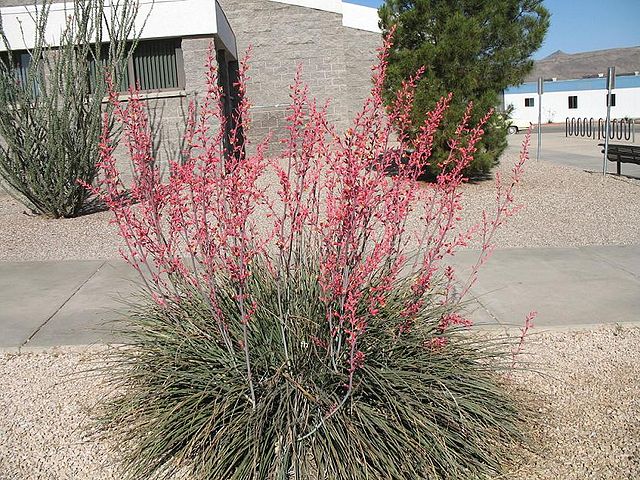
Image: Fritz Hochstätter, CC BY-SA 3.0 DE, via Wikimedia Commons
JB163 Red Yucca ( Hesperaloe parviflora )
Also known as red yucca, hummingbird yucca, redflower false yucca and samandoque, is a plant that is native to Chihuahuan desert of west Texas east and south into central and south Texas and northeastern Mexico around Coahuila.
Hesperaloe parviflora has narrow evergreen leaves with a fringe of white threadlike hairs along their edges and grows in clumps 3–6 feet high and wide. Red or yellow tubular flowers are borne on branching flower stalks (inflorescences) up to 5 feet tall from late spring to mid-summer.
This species has become popular in xeriscape landscape design for public and private gardens in California and the Southwestern United States. The plant's qualities include drought tolerance, heat resistance, low maintenance needs, hummingbird attracting flowers, and an architectural form. It also is a spineless alternative to Agave and Yucca horticultural species.
Hardy to well below 0°F some say as low as -20°F (USDA zone 5). It is a good clean plant for desert and succulent gardens, planted in masses or used in pots.
Hesperaloe parviflora has narrow evergreen leaves with a fringe of white threadlike hairs along their edges and grows in clumps 3–6 feet high and wide. Red or yellow tubular flowers are borne on branching flower stalks (inflorescences) up to 5 feet tall from late spring to mid-summer.
This species has become popular in xeriscape landscape design for public and private gardens in California and the Southwestern United States. The plant's qualities include drought tolerance, heat resistance, low maintenance needs, hummingbird attracting flowers, and an architectural form. It also is a spineless alternative to Agave and Yucca horticultural species.
Hardy to well below 0°F some say as low as -20°F (USDA zone 5). It is a good clean plant for desert and succulent gardens, planted in masses or used in pots.
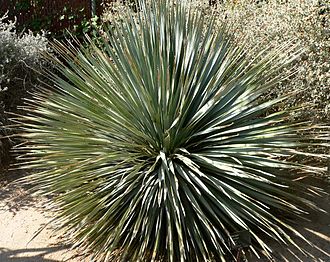
Image:
By Stan Shebs
LET826 Desert Spoon ( Dasylirion wheeleri )
Also known as Spoon Yucca. Dasylirion wheeleri is a moderate to slow-growing evergreen shrub with a single unbranched trunk up to 16 inches thick growing to about 5 feet tall, though often recumbent on the ground. The leaf blade is slender, gray-green, with a toothed margin. The leaves radiate from the center of the plant's apex in all directions (spherical).
The flowering stem grows above the foliage, to a height of 16 feet tall. The stem is topped by a long plume of straw-colored small flowers. The color of the flower determinate the gender of the plant, being mostly white colored for males and purple-pink for females.
It is grown as an ornamental plant, valued in xeriscaping. As it does not tolerate extended frosts, in temperate regions it is usually grown under glass. It has gained the Royal Horticultural Society's Award of Garden Merit.
The flowering stem grows above the foliage, to a height of 16 feet tall. The stem is topped by a long plume of straw-colored small flowers. The color of the flower determinate the gender of the plant, being mostly white colored for males and purple-pink for females.
It is grown as an ornamental plant, valued in xeriscaping. As it does not tolerate extended frosts, in temperate regions it is usually grown under glass. It has gained the Royal Horticultural Society's Award of Garden Merit.
The alcoholic drink sotol, the northern cousin to tequila and mezcal, is made from the fermented inner cores of the desert spoon. It is the state drink of the Mexican states of Chihuahua, Durango, and Coahuila.
It was also used by the natives of the region for food and fiber. Its flower stalk can be used as a fire plow.
Cold hardy to 10 degrees.
The Tarahumara and Pima Bajo peoples of the Sierra Madre Occidental of Chihuahua weave baskets from the leaves after they strip off the spines from the leaf margins. They also employ the expanded leaf bases in making large artificial flowers as holiday decorations.

